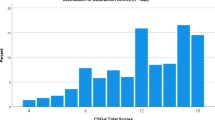Abstract
This study assessed the psychometric properties of a questionnaire designed to measure consumer satisfaction with inpatient psychiatric care. To this end, 37 inpatient psychiatric units from across the United States agreed to participate. The questionnaire was completed by 1,351 individuals, or a responsible party, for an average response rate of 53%. The factor analysis identified six scales: Nonclinical Services, Psychiatric Care, Staff, Medical Outcome, Patient Education, and Program Components/Activities. The internal reliability of the scales was high to moderate (.88 to .74). Results of a stepwise regression model showed good criterion-related validity, explaining 58% of the variance in overall quality ratings. Little shrinkage in this variance occurred when the model was cross-validated. Also, differences in satisfaction levels were noted for select facility and consumer characteristics. Results are interpreted as providing support for the reliability and validity of a newly developed consumer satisfaction survey for use in evaluating inpatient psychiatric care.
Similar content being viewed by others
References
Richmond I, Roberson E: The customer is always right: Patients' perceptions of psychiatric nursing actions.Journal of Nursing Care Quality 1995; 2:36–43.
Berman S: Putting it (performance measures) together: An interview with Jerod Loeb.The Joint Commission Journal on Quality Improvement 1996; 22(7):518–526.
Joint Commission on the Accreditation of Healthcare Organization's (JCAHO): Expectations of hospitals and long term care organizations.ORYX Outlook 1997; 1:2.
Parasuraman A, Zeithaml VA, Berry LL: A conceptual model of service quality and its implications for future research.Journal of Marketing 1985; 49:41–50.
Shostack GL: Service positioning through structural change.Journal of Marketing 1987; 51:34–43.
Solomon M, Suprenant C, Czepiel JA, et al.: A role theory perspective on dyadic interactions: The service encounter.Journal of Marketing 1985; 49:99–111.
Carey RG, Seibert JH: A patient survey system to measure quality improvement: Questionnaire reliability and validity.Medical Care 1993; 31:834–845.
Seibert JH, Strohmeyer JM, Carey RG: Evaluating the physician office visit: In pursuit of a valid and reliable measure of quality improvement efforts.Journal of Ambulatory Care Management 1996; 19(1):17–37.
Fisk TA, Brown CJ, Cannizzaro K, et al.: Creating patient satisfaction and loyalty.Journal of Health Care Marketing 1990; 2:5–15.
Pablo RY: Assessing patient satisfaction in long-term care institutions.Hospital Administration in Canada 1975; 17:22–32.
Pascoe, GC: Patient satisfaction in primary health care: A literature review and analysis.Evaluation and Program Planning 1983; 6:185–210.
Corrigan, PW: Consumer satisfaction with institutional and community care.Community Mental Health Journal 1990; 26(2):151–165.
Hays WL:Statistics. 5th ed. Austin, TX: Harcourt Brace, 1994.
Le Vois M, Nguyen TD, Attkisson CC: Artifact in client satisfaction assessment.Evaluation and Program Planning 1981; 4:139–150.
Elbeck M, Fecteau G: Improving the validity of measures of patient satisfaction with psychiatric care and treatment.Hospital and Community Psychiatry 1990; 9:998–1001.
Glass AP: Identifying issues important to patients on a hospital satisfaction questionnaire.Psychiatric Services 1995; 46(1):83–85.
Bowling A: Assessing health needs and measuring patient satisfaction.Nursing Times 1992; 88(31):31–34.
Technical Assistance Research Programs Institute:Consumer Complaint Handling in America: An Update Study. Washington, DC: Consumer Affairs Council of the U.S. Office of Consumer Affairs, U.S. Department of Commerce, 1986.
Distefano M, Pryer M, Garrison J: Attitudinal, demographic and outcome correlates of client's satisfaction.Psychological Report 1980; 46:287–290.
Herman RC, Ettner SL, Dorwat RA: The influence of psychiatric disorders on patients' ratings of satisfaction with health care.Medical Care 1998; 36(5):720–727.
Baker L, Zucher PJ, Gross MJ: Using client satisfaction surveys to evaluate and improve services in locked and unlocked adult inpatient facilities.Journal of Behavioral Health Services & Research 1998; 25(1):51–63.
Rosenheck R, Wilson NJ, Meterko M: Influence of patient and hospital factors on consumer satisfaction with inpatient mental health treatment.Psychiatric Services 1997; 48(12):1553–1561.
Cronbach L: Coefficient alpha and the internal structure of tests.Psychometrika 1951; 16:297–334.
Helmstader GC:Principles of Psychological Measurement. New York: Appleton-Century-Crofts, 1964.
Nunnally JC:Psychometric Theory. 2nd ed. New York: McGraw-Hill, 1978.
Anastasi A:Psychological Testing. 6th ed. New York: Macmillan, 1988.
Pedhazur EJ:Multiple Regression in Behavioral Research. 3rd ed. New York: Holt, Rinehart & Winston, 1997.
SAS/STAT User's Guide, Version 6. 4th ed. Cary, NC: SAS Institute, 1992.
Noursis MJ:SPSS for Windows Base System User's Guide Release 6.0. Chicago: SPSS.
Holcomb WR, Adams NA, Ponder HM, et al.: The development and construct validation of a consumer satisfaction questionnaire for psychiatric patients.Evaluation and Program Planning 1989; 12:189–194.
Teague, GB, Ganji, V, Hornik, JA, et al.: The MHSIP mental health report card: A consumer-oriented approach to monitoring the quality of mental health plans.Evaluation Review 1997; 21(3):330–341.
National Committee for Quality Assurance: Final HEDIS volume released by NCQA.Health Management Technology 1997; 18(6):8.
Author information
Authors and Affiliations
Corresponding author
Rights and permissions
About this article
Cite this article
Kolb, S.J., Race, K.E.H. & Seibert, J.H. Psychometric evaluation of an inpatient psychiatric care consumer satisfaction survey. The Journal of Behavioral Health Services & Research 27, 75–86 (2000). https://doi.org/10.1007/BF02287805
Issue Date:
DOI: https://doi.org/10.1007/BF02287805




